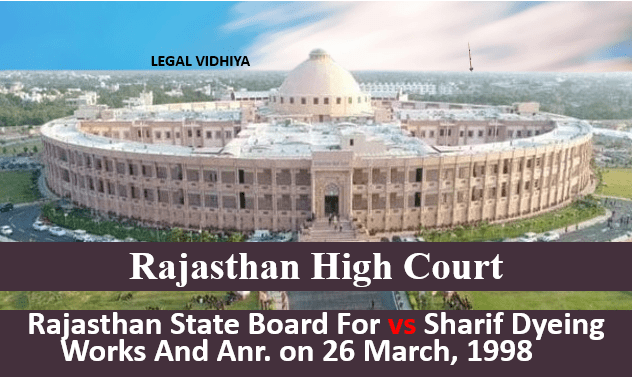
Rajasthan State Board For vs Sharif Dyeing Works And Anr. on 26 March, 1998
Overview of the Case:
citations: 1998 (3) WLC 452, 1998 (1) WLN 328
Date of Judgment 26 March, 1998
Court Rajasthan HigCourt
Appellant Rajasthan State Board For
Respondent Sharif Dyeing Works And Anr
Bench A K Singh
Facts of the Case:
Criminal Cases Nos. 270 of 1983, No. 272 of 1983, No. 269 of 1983, No. 268 of 1993, No. 271 of 1983 and No. 267 of 1983 on behalf of the Rajasthan State Board of Control for State Prevention of Pursuant to the complaint under Pollution, Jaipur alleges that it has committed offenses punishable under Sections 42 and 44 of the Water (Prevention and Control of Pollution) Act, 1974 (hereinafter referred to as the 1974 Act). I’m here. The above case was registered as a complaint because it is a crime under Section 1 Section A Section 190 of the Criminal Procedure Code of 1973. On July 11, 1365, the plaintiff did not appear in court. From Addl. Judge when the hearing is called. The head of the wizard. On the same day, Justice Balotra released the accused under section 249 of the Code of Criminal Procedure 1973 for the complainant’s absence. The powers of Article 249 of the Criminal Procedure Law were exercised by the Addl. judge The head of the wizard. Justice Balotra, as the offenses under Sections 42 and 44 of the Act of 1974 were non-cognizable offences, and as such he had been advised of Addl. The head of the wizard. Considering that the crimes of articles 42 and 44 of the law of 1353 are indistinguishable, the judge issued the verdict of the defendant’s release according to article 249 of the criminal procedure law.
Issue:
Whether that the offences under Sections 42 and 44 and the Act of 1974 were non-cognisable offences?
Argument by Petitioner:
The petitioner has submitted that the offenses under Sections 42 and 44 of the 1974 Act are punishable with imprisonment for a term exceeding 2 years and, therefore, these cases were warrant cases, but not the powers conferred by Section 249 of the Code of Criminal Procedure. was used by Addl. Chief Justice. Magistrate for the purpose of discharging the accused due to non-appearance of the complainant, as the offenses recorded were neither compoundable nor non-cognizable offences. Therefore, he has submitted that the orders passed by the Courts below are illegal, without jurisdiction and amount to abuse of court process and, therefore, deserve to be set aside.
Argument by Respondent:
Respondent have submitted that though these offences under Sections 42 and 44 of the Act of 1974 “are not compoundable”, they are “non-cognisable offences” and, therefore, the Addl. Chief Judicial Magistrate, Balotra could exercise the power under Section 249 of the Criminal Procedure Code for discharging the accused-persons on the ground that the complainant was not present. It is, therefore, prayed that these petitions should be dismissed.
Judgement:
I am of the view that the conditions limiting the jurisdiction of the Court under Section 190 of the Code of Criminal Procedure are directly related to the definitions given in Sections 2(c) and 2(1) of the Code of Criminal Procedure. It is imposed to limit the powers of police officers to arrest without a warrant, and not to convert a cognizable offense into a non-cognizable one. These must be treated as separate and distinguishable things having different meanings, so that if the power to arrest without a warrant is taken away, even if the offense is cognizable, it is cognizable. An example of this case is the issue of Article 202 of the Criminal Procedure Law, in which the authority to arrest may be given without a legal order, and as a result, the case may be identified despite the alleged crime. The act committed may be a non-cognizable offence.
Violation under Section 42 of the 1974 Act shall be punishable with imprisonment for a term not exceeding three months or with a fine not exceeding 10,000 rupees. Violation of Article 44 of Law 1353 is punishable by imprisonment from one year and 6 months to a maximum of 6 years and a fine. According to the punishments stipulated in the law, the crimes under Article 42 should be considered non-cognizable crimes, because their punishment is a maximum of three years in prison. However, an offense under Section 44 of the Act must be considered a cognizable offense because under Schedule I, the maximum sentence of imprisonment for such offense is six years.
I therefore hold that an offense under section 44 of the Act of 1974 is a “cognizable” offense within the meaning of section 2(c) of the Code of Criminal Procedure and therefore the provisions of section 249 do not apply. I have an opinion. Views taken by Learned Addl. The chief justice and the judge and the knowledgeable sessions of the district were wrong in considering the above crimes as undetected crimes. The order of acquittal of the accused passed on July 2, 1986, which is alleged to be without jurisdiction under Section 249 of the Code of Criminal Procedure, amounts to an abuse of the process of the court.
Conclusion:
According to the above-mentioned reasons in the petition, all six petitions submitted are entitled to be heard according to Article 482 of the Criminal Procedure Law. Denial order dated 2nd July, 1986 was passed by learned Addl. The order of conviction dated 31st July, 1987 passed by the Chief Justice of Balotra and the District Judge of Balotra is hereby set aside. Addl. Chief Justice Balotra is directed here to pursue the case and give judgment according to law.
Reference:
https://indiankanoon.org/doc/1581405/
https://legaldata.in/bare-acts/water-prevention-and-control-of-pollution-act-1974/section-2
This article is written by Naman Jain of Galgotias University, Intern Under Legal Vidhiya.




0 Comments